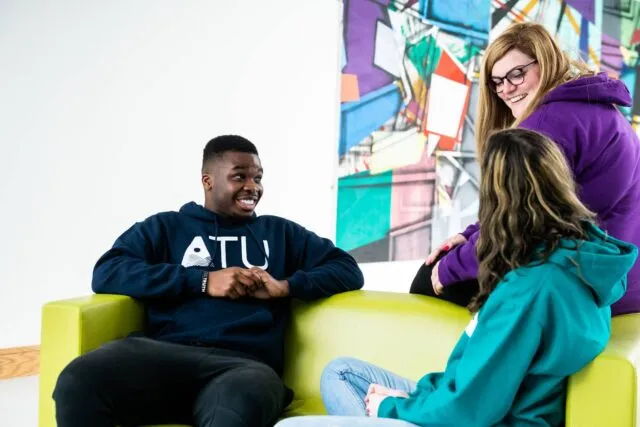Courses
Creative Practice
Master of Arts
Course Details
| Course Code | GA_ACPRG_V09 |
|---|---|
| Level | 9 |
| Duration | 1/2 years |
| Credits | 90 |
| Method of Delivery | On-campus |
| Campus Locations | Galway City – Wellpark Road |
| Mode of Delivery | Full Time, Part Time |

Course Overview
2. Professional Development (10 credits)
3. Research and Innovation (10 credits)
Course Details
Year 1
| Semester | Module Details | Credits | Mandatory / Elective |
|---|---|---|---|
| Year |
Research and InnovationResearch and Innovation ( R&I ) (10 credits) focuses on the 'how' and the 'why' of research methodologies and the means of validation available. Students are faced with the following questions: How do you go about doing what you do? Why do you do what you do? How does your work compare to contemporary models of best practice in your field? And finally, can you define its relevance in relation to these? R&I familiarizes students with a range of working processes and approaches in a variety of creative practices. They consider the range of debates therein (issues of sustainability, diversity, methodological concerns, etc.) and the contested nature of creative practice. R&I lays the foundations for students to locate their practice within the wider competitive field, taking cognizance of new strategies and approaches in research and innovation. This will proceed through a series of workshops which will culminate in the student giving two seminar presentations on their practice. The first focuses on key terms, ideas and debates defining their area of practice, the second considers models of best practice defining their field. This material is drawn together for a final R&I essay which aims to integrate practical concerns with a critical contextualization; an integration that will be underpinned by a thorough understanding of methodological concerns and strategies for innovation. Learning Outcomes 1. Reveal a knowledge and understanding of the diversity of working processes in a variety of creative practices 2. Articulate the key ideas and debates defining theirarea of practice – from subject specific and methodological concerns to wider questions such as diversity and sustainability 3. Situate their own practice in relation to best models of practice defining their field 4. Implement self-reflexive critical thinking in relation to their own working practice and research methods 5. Source appropriate information through library and internet research tools and evaluate the quality of material uncovered 6. Deliver a professional presentation through the seminar format and the written word |
10 | Mandatory |
| Year |
Themes and IssuesThemes and Issues (T&I) (10 credits) provides students with a broad overview of existing practices, themes and debates though a series of lectures, seminars, field trips and symposia. Lectures present case studies of successful practices. Students work collaboratively to produce team-based seminars and introduce, outline and discuss a selected theme or topic of concern. Field trips identify exhibitions and film festivals worth visiting. The symposium extends discussion beyond the seminar room into the public realm to engage with the wider cultural community. Learning Outcomes 1. Display a thorough knowledge and understanding of current debates and issues within contemporary creative practices. |
10 | Mandatory |
| Year |
Professional DevelopmentThis module equips students with the knowledge and skills to develop professional strategies appropriate to their practice and their aspirations for future careers within the creative industries. The student will develop project proposals that include marketing, business and public engagement strategies that are informed by the demands of a competitive creative sector. They will also develop a professional public platform for their creative practice that adequately articulates the depth and breadth of their project research through the development of a social media platform,website or publication. The module will also help the student to optimise the opportunity of the MA show and use it as a launch for a professional career as artist, designer, filmmaker or other creative practitioner. Learning Outcomes 1. Engage in group discussion and learning in relation to different forms of public presentation/ engagement – e.g. exhibition, websites, social media platforms, public art projects, film screenings and art publications 2. Develop and maintain an online public profile through a social media platform or website along with a marketing and engagementstrategy for career development 3. Manage projects, prepare and assess costings, develop business/project plans including budget, timeline, risk assessments, plan and implement marketing and promotion of an individual or group project or business 4. Apply in-depth knowledge and understanding of cultural and strategicpolicies/plans and sustainabilityandapply knowledge and understanding ofthese policies and concerns to the development of applications and proposals 5. Identify, interact and engage constructively with potential audience/clients, industry professionals and cultural institutions through research, developing mailing lists ,via social media and web- based engagement and interaction and general profession practice |
10 | Mandatory |
| Year |
Research Project and ThesisThis is the largest module in this course, consisting of 60 of the 90 credits. It concentrates on the student initiating a research proposal which will then be guided and developed to completion by the end of the module. There are two strands to this module. First, a practice-based element where the student focuses on developing their art, film, digital media or socially engaged practice to completion. The second strand, the Critical Review, seeks to critically contextualize their practice through the written form, taking into consideration the wider social and cultural fields in which their practice will perform. Teaching proceeds through one-to-one and group tutorials and critiques. The project culminates with the production of a final exhibition, film screening or project presentation. Learning Outcomes 1. Ability to complete a final research project at an advanced professional level for public engagement/exhibition, taking it through proposal, planning and final stages to completion 2. Demonstrateadvanced knowledge of essential research skills to locate and access relevant material through exhibitions, screenings, symposia, libraries, archives, data bases and other resource centres 3. Apply analytical and research skills through the consideration of challenging exhibitions, film, written texts and visual artifacts 4. Reflect critically upon their own practice in relation to competing models of practice and competing value systems at play within contemporary creative practices. These can range from methodological concerns to wider ethical concerns such asdiversity and sustainability 5. Display core research and writing skills necessary for the production of a critically reflective contextualisation of their practice |
60 | Elective |
| Year |
Creative Practice ProjectsThis module begins with a practice-based research proposal which will be guided and developed to completion by the end of the course. The student will focus on developing their art, design, film, digital media or socially engaged practice project to completion. The outputs will include a tangible output and a short research report.Teaching proceeds through one-to-one and group tutorials. The project culminates with the production of a final exhibition, film screening or project presentation. Learning Outcomes 1. Execute a practice-based research project at an advanced professional level for commercial application or public exhibition, taking it through proposal, planning, research, development and final stages to completion. 4. Demonstrate mastery of research and writing skills required for the production of practice-based research reports |
30 | Elective |
| Year |
Minor ThesisThis module seeks to critically contextualize the students practice and projects through the written form, taking into consideration the wider social and cultural fields in which their practice will perform. Teaching proceeds through one-to-one and group tutorials. The project culminates with the production of written thesis. Learning Outcomes 1. Apply advanced research skills to bridge practical and theoretical methods to locate and access relevant material through exhibitions, screenings, symposia, libraries, archives, data bases and other resource centres. 4. Display advanced research and writing skills necessary for the production of a critically reflective contextualisation of their practice |
30 | Elective |
Examination and Assessment
Note: Where assessment on the programme involves examinations, these are held on campus or at another exam venue in the Republic of Ireland. There are typically two exam periods: January and May. Times scheduled for examinations (face to face / online exams ) are in GMT.
On-Campus Attendance Requirement
Note: Check programme Examination and Assessment requirements, as they may involve examinations to be taken on campus.
Download a prospectus
Entry Requirements
A CV detailing their qualifications and career to date.
A short visual record of previous work.
A personal motivational statement which should include an outline of their plans and interests related to Creative Practice and potential Practice-Based Research.
Testimonial
“I came to the MA in Creative Practice as an experienced Documentary Maker and Editor working in the Film and TV industry. I felt that my practice needed re calibrating, and I wanted to do this in a supportive and challenging environment. I was also eager to gain new knowledge and experience in making work outside of my comfort zone. With excellent guidance by my tutors, I was led towards a socially engaged methodology of making artwork and developed new skills and confidence in my art making practices. The process of writing a research dissertation around the themes explored in my artwork was a particularly enriching and rewarding experience.”
Jill Beardsworth , Master of Arts in Creative Practice
Careers
Further Information
Who Should Apply?
Application Closing Date
Start Date
Contact Information
Department of Creative Art & Media
Dr. Gavin Murphy
T: +353 (0) 91 770661
E: gavin.murphy@atu.ie

Creative Arts & Media


